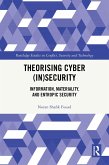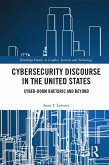US National Cybersecurity (eBook, PDF)
International Politics, Concepts and Organization
Redaktion: Puyvelde, Damien van; Brantly, Aaron
47,95 €
47,95 €
inkl. MwSt.
Sofort per Download lieferbar

24 °P sammeln
47,95 €
Als Download kaufen

47,95 €
inkl. MwSt.
Sofort per Download lieferbar

24 °P sammeln
Jetzt verschenken
Alle Infos zum eBook verschenken
47,95 €
inkl. MwSt.
Sofort per Download lieferbar
Alle Infos zum eBook verschenken

24 °P sammeln
US National Cybersecurity (eBook, PDF)
International Politics, Concepts and Organization
Redaktion: Puyvelde, Damien van; Brantly, Aaron
- Format: PDF
- Merkliste
- Auf die Merkliste
- Bewerten Bewerten
- Teilen
- Produkt teilen
- Produkterinnerung
- Produkterinnerung

Bitte loggen Sie sich zunächst in Ihr Kundenkonto ein oder registrieren Sie sich bei
bücher.de, um das eBook-Abo tolino select nutzen zu können.
Hier können Sie sich einloggen
Hier können Sie sich einloggen
Sie sind bereits eingeloggt. Klicken Sie auf 2. tolino select Abo, um fortzufahren.

Bitte loggen Sie sich zunächst in Ihr Kundenkonto ein oder registrieren Sie sich bei bücher.de, um das eBook-Abo tolino select nutzen zu können.
This volume offers an overview of the growing body of knowledge about cyber security and the related policy debates, with an emphasis on the role of state actors in cyberspace.
- Geräte: PC
- mit Kopierschutz
- eBook Hilfe
- Größe: 4.65MB
Andere Kunden interessierten sich auch für
![Theorising Cyber (In)Security (eBook, PDF) Theorising Cyber (In)Security (eBook, PDF)]() Noran Shafik FouadTheorising Cyber (In)Security (eBook, PDF)41,95 €
Noran Shafik FouadTheorising Cyber (In)Security (eBook, PDF)41,95 €![Routledge Handbook of International Cybersecurity (eBook, PDF) Routledge Handbook of International Cybersecurity (eBook, PDF)]() Routledge Handbook of International Cybersecurity (eBook, PDF)45,95 €
Routledge Handbook of International Cybersecurity (eBook, PDF)45,95 €![Cybersecurity Discourse in the United States (eBook, PDF) Cybersecurity Discourse in the United States (eBook, PDF)]() Sean T. LawsonCybersecurity Discourse in the United States (eBook, PDF)41,95 €
Sean T. LawsonCybersecurity Discourse in the United States (eBook, PDF)41,95 €![Islamic State in Australia (eBook, PDF) Islamic State in Australia (eBook, PDF)]() Rodger ShanahanIslamic State in Australia (eBook, PDF)41,95 €
Rodger ShanahanIslamic State in Australia (eBook, PDF)41,95 €![War and International Relations (eBook, PDF) War and International Relations (eBook, PDF)]() Balazs SzantoWar and International Relations (eBook, PDF)39,95 €
Balazs SzantoWar and International Relations (eBook, PDF)39,95 €![Foreign Intervention, Warfare and Civil Wars (eBook, PDF) Foreign Intervention, Warfare and Civil Wars (eBook, PDF)]() Adam LockyerForeign Intervention, Warfare and Civil Wars (eBook, PDF)41,95 €
Adam LockyerForeign Intervention, Warfare and Civil Wars (eBook, PDF)41,95 €![Securitization Outside the West (eBook, PDF) Securitization Outside the West (eBook, PDF)]() Christian KaunertSecuritization Outside the West (eBook, PDF)0,00 €
Christian KaunertSecuritization Outside the West (eBook, PDF)0,00 €-
-
-
This volume offers an overview of the growing body of knowledge about cyber security and the related policy debates, with an emphasis on the role of state actors in cyberspace.
Dieser Download kann aus rechtlichen Gründen nur mit Rechnungsadresse in A, B, BG, CY, CZ, D, DK, EW, E, FIN, F, GR, HR, H, IRL, I, LT, L, LR, M, NL, PL, P, R, S, SLO, SK ausgeliefert werden.
Produktdetails
- Produktdetails
- Verlag: Taylor & Francis eBooks
- Seitenzahl: 238
- Erscheinungstermin: 20. Juli 2017
- Englisch
- ISBN-13: 9781351847452
- Artikelnr.: 48839730
- Verlag: Taylor & Francis eBooks
- Seitenzahl: 238
- Erscheinungstermin: 20. Juli 2017
- Englisch
- ISBN-13: 9781351847452
- Artikelnr.: 48839730
- Herstellerkennzeichnung Die Herstellerinformationen sind derzeit nicht verfügbar.
Damien Van Puyvelde is Assistant Professor of Security Studies at The National Security Studies Institute, The University of Texas at El Paso. Aaron F. Brantly is Assistant Professor in the Department of Social Sciences and the Army Cyber Institute, West Point, USA. He is author of The Decision to Attack: Military and Intelligence Cyber Decision-Making (2016).
1. Introduction, Damien Van Puyvelde and Aaron F. Brantly
PART I: The International Politics of Cybersecurity
2. Cybersecurity and Cross Domain Deterrence, Jon Lindsay and Erik Gartzke
3. Crossing the Rubicon: Identifying and Responding to an Armed
Cyberattack, Nerea M. Cal
4. The Outlook for Constraining International Norms for Offensive Cyber
Operations, Brian Mazanec
5. Developing an International Cyberspace Security Governance Framework:
Comparisons to Outer Space, Tim Ridout
PART II: Conceptualizing Cybersecurity
6. Traditional Military Thinking in Cyberspace: The Need for Adaptation,
Jan Kallberg
7. Epidemiological Approaches to National Cybersecurity, Aaron F. Brantly
8. The Defender's Innovator's Challenge: Can the US Army Learn to Out-Hack
Those Who Attack Us in Cyberspace?, Ernest Y. Wong, Katherine R. Hutton And
Ryan F. Gagnon
9. Evolving Cyber Intelligence, Stephen Gary and Randy Borum
10. Changing the Game: Cyberspace and Big Data Driven National Security
Intelligence, Aaron F. Brantly
PART III: Organizing Cybersecurity
11. Cybersecurity in the United States and the United Kingdom: The Need for
Trust and Cooperation, Kris Stoddart
12. From Information to Cybersecurity: Bridging the Public-Private Divide,
Damien Van Puyvelde
13. Training Cyber Intelligence Coalitions, Scott Bethel and John
Whisenhunt
14. Conclusion, Aaron F. Brantly AND Damien Van Puyvelde
PART I: The International Politics of Cybersecurity
2. Cybersecurity and Cross Domain Deterrence, Jon Lindsay and Erik Gartzke
3. Crossing the Rubicon: Identifying and Responding to an Armed
Cyberattack, Nerea M. Cal
4. The Outlook for Constraining International Norms for Offensive Cyber
Operations, Brian Mazanec
5. Developing an International Cyberspace Security Governance Framework:
Comparisons to Outer Space, Tim Ridout
PART II: Conceptualizing Cybersecurity
6. Traditional Military Thinking in Cyberspace: The Need for Adaptation,
Jan Kallberg
7. Epidemiological Approaches to National Cybersecurity, Aaron F. Brantly
8. The Defender's Innovator's Challenge: Can the US Army Learn to Out-Hack
Those Who Attack Us in Cyberspace?, Ernest Y. Wong, Katherine R. Hutton And
Ryan F. Gagnon
9. Evolving Cyber Intelligence, Stephen Gary and Randy Borum
10. Changing the Game: Cyberspace and Big Data Driven National Security
Intelligence, Aaron F. Brantly
PART III: Organizing Cybersecurity
11. Cybersecurity in the United States and the United Kingdom: The Need for
Trust and Cooperation, Kris Stoddart
12. From Information to Cybersecurity: Bridging the Public-Private Divide,
Damien Van Puyvelde
13. Training Cyber Intelligence Coalitions, Scott Bethel and John
Whisenhunt
14. Conclusion, Aaron F. Brantly AND Damien Van Puyvelde
1. Introduction, Damien Van Puyvelde and Aaron F. Brantly
PART I: The International Politics of Cybersecurity
2. Cybersecurity and Cross Domain Deterrence, Jon Lindsay and Erik Gartzke
3. Crossing the Rubicon: Identifying and Responding to an Armed
Cyberattack, Nerea M. Cal
4. The Outlook for Constraining International Norms for Offensive Cyber
Operations, Brian Mazanec
5. Developing an International Cyberspace Security Governance Framework:
Comparisons to Outer Space, Tim Ridout
PART II: Conceptualizing Cybersecurity
6. Traditional Military Thinking in Cyberspace: The Need for Adaptation,
Jan Kallberg
7. Epidemiological Approaches to National Cybersecurity, Aaron F. Brantly
8. The Defender's Innovator's Challenge: Can the US Army Learn to Out-Hack
Those Who Attack Us in Cyberspace?, Ernest Y. Wong, Katherine R. Hutton And
Ryan F. Gagnon
9. Evolving Cyber Intelligence, Stephen Gary and Randy Borum
10. Changing the Game: Cyberspace and Big Data Driven National Security
Intelligence, Aaron F. Brantly
PART III: Organizing Cybersecurity
11. Cybersecurity in the United States and the United Kingdom: The Need for
Trust and Cooperation, Kris Stoddart
12. From Information to Cybersecurity: Bridging the Public-Private Divide,
Damien Van Puyvelde
13. Training Cyber Intelligence Coalitions, Scott Bethel and John
Whisenhunt
14. Conclusion, Aaron F. Brantly AND Damien Van Puyvelde
PART I: The International Politics of Cybersecurity
2. Cybersecurity and Cross Domain Deterrence, Jon Lindsay and Erik Gartzke
3. Crossing the Rubicon: Identifying and Responding to an Armed
Cyberattack, Nerea M. Cal
4. The Outlook for Constraining International Norms for Offensive Cyber
Operations, Brian Mazanec
5. Developing an International Cyberspace Security Governance Framework:
Comparisons to Outer Space, Tim Ridout
PART II: Conceptualizing Cybersecurity
6. Traditional Military Thinking in Cyberspace: The Need for Adaptation,
Jan Kallberg
7. Epidemiological Approaches to National Cybersecurity, Aaron F. Brantly
8. The Defender's Innovator's Challenge: Can the US Army Learn to Out-Hack
Those Who Attack Us in Cyberspace?, Ernest Y. Wong, Katherine R. Hutton And
Ryan F. Gagnon
9. Evolving Cyber Intelligence, Stephen Gary and Randy Borum
10. Changing the Game: Cyberspace and Big Data Driven National Security
Intelligence, Aaron F. Brantly
PART III: Organizing Cybersecurity
11. Cybersecurity in the United States and the United Kingdom: The Need for
Trust and Cooperation, Kris Stoddart
12. From Information to Cybersecurity: Bridging the Public-Private Divide,
Damien Van Puyvelde
13. Training Cyber Intelligence Coalitions, Scott Bethel and John
Whisenhunt
14. Conclusion, Aaron F. Brantly AND Damien Van Puyvelde







